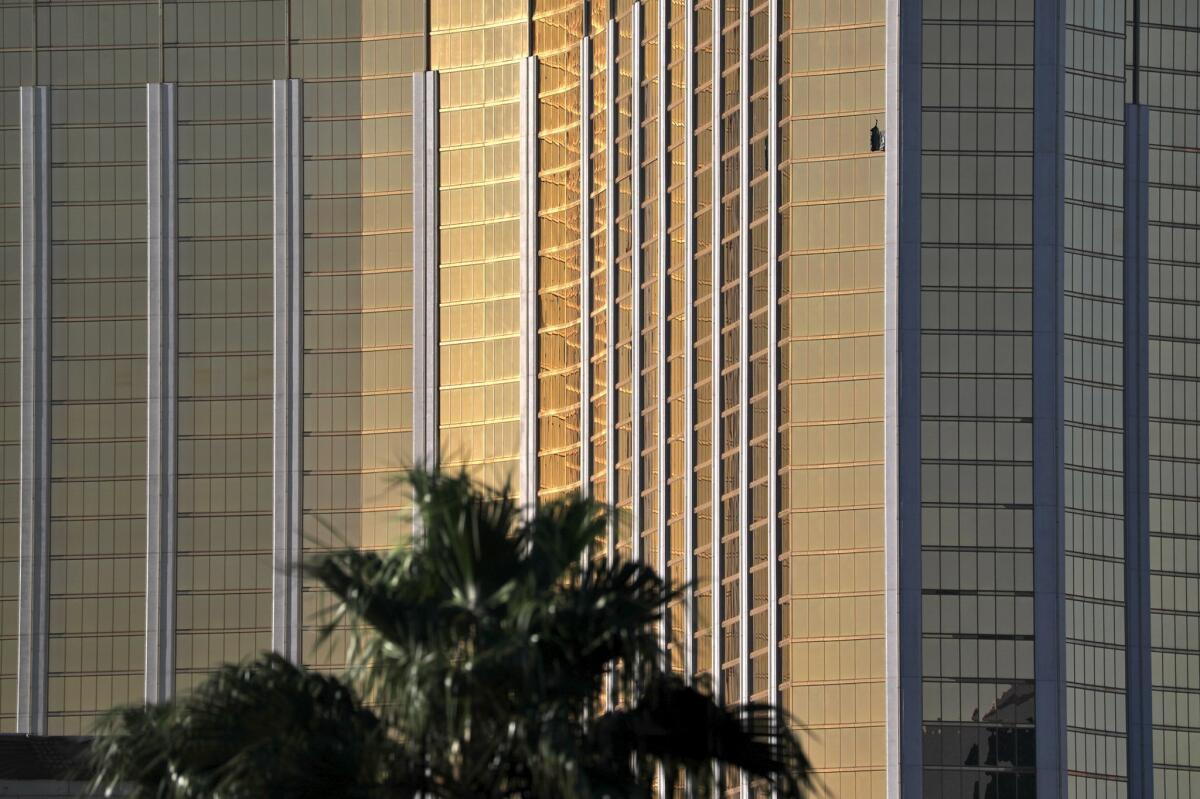Settlement for victims of Las Vegas massacre worth up to $800 million

LAS VEGAS — Robert Eglet settled behind microphones Thursday morning — his face reflected in the shiny red wood of the conference table — and said what might be expected after earning thousands of shooting victims up to $800 million in a lawsuit settlement.
He said nothing could bring back the 58 who were killed by the lone gunman who perched himself in a suite on the 32nd floor of the Mandalay Bay Hotel and Casino on Oct. 1, 2017, and opened fire on thousands across the Las Vegas Strip attending the Route 91 country music festival.
For the record:
11:23 a.m. Oct. 4, 2019An earlier version of this article misidentified shooter Stephen Paddock as Richard Paddock.
He said the settlement — which will be between $735 million and $800 million — saved at least a decade’s worth of legal wrangling between the victims and MGM Resorts International.
He said it was fair compensation.
But after the news conference was over, he said he was frustrated that a certain group would once again not be held to account in a mass shooting: gun manufacturers.
“I think MGM, to a certain extent, is the victim, because if the gun manufacturers didn’t have immunity, that would have been the focus of the lawsuits probably,” Eglet said. “When it comes to the responsibility for this, the gun manufacturers skated because they have immunity. MGM was put in the position of having to come up and resolve this.”
Eglet was referring to a 2005 federal law that prohibits gun makers and dealers from being held liable when their products are used in a crime.
More than half of the 164 mass shootings over the last 50 years have occurred since 2000, and a third over the last nine years, according to the U.S. Department of Justice, whose tally includes every shooting with at least four victims.
The last few years have been the deadliest. El Paso, Tree of Life, Dayton, Odessa, Gilroy, Parkland — the list goes on — have generated news cycles of grief, weariness and despair and made gun violence a top political issue.
Eglet, speaking near the end of the hourlong news conference at his office in Las Vegas, urged politicians to take action.
“Are we really free when children in our country are afraid to go to school because they might be shot?” he asked. “Are we really free in this country where people are afraid to go to the movies? Or the grocery store, for fear there may be some mass shooting there?”
“I don’t feel very free,” he said.
The Las Vegas shooting was the largest in modern American history. The police and the FBI have never been able to explain what motivated the killer, Stephen Paddock, a 64-year-old gambler who favored high-stakes video poker machines.
In the 34 years before September 2016, Paddock had purchased 29 firearms. But in 11 months leading up to his attack, he bought more than 55 guns and over 100 accessories, including scopes, cases and ammunition.
Paddock shot and killed himself, and when police entered his hotel room they discovered about two dozen firearms, including a dozen fitted with “bump stocks,” which are used to simulate automatic firing and were recently outlawed as a result of the massacre.
Paddock fired more than 1,100 rounds from his room. Investigators also found more than 4,000 rounds of unused ammunition for AR-15s, AR-10s and other guns, along with explosives.
Lawyers for victims and their families said they hoped the settlement with MGM would spur corporations to push lawmakers to change gun laws.
“Now companies like MGM are stepping into this; I think the government is going to listen to companies like that,” said Kevin Boyle, a Los Angeles-based lawyer representing several hundred victims.
That desire was not universal. Mo Aziz, whose Houston-based firm represented more than 1,300 plaintiffs, said most of his clients weren’t interested in holding gun makers accountable.
“From my group of clients, many hunt and fish and are gun owners — 2nd Amendment folks — and it wasn’t an avenue they wanted to pursue,” he said. “The gun debate is a very complex issue.”
He said the settlement did, however, “send a message that corporations can control their own premises and make their properties more secure.”
The settlement will be paid out sometime next year after a court-appointed administrator determines how much each plaintiff will receive, according to Eglet. He declined to say how much his firm would earn from the settlement.
MGM may end up not paying anything out of its own pocket. Earlier this year, in a financial disclosure to shareholders, the company revealed it had insurance that would pay out up to $751 million.
The resolution Thursday essentially ends all claims against MGM under a statute of limitations that expires two years after the event.
Eglet said the parties agreed to the settlement Monday, but didn’t want to make it public on the anniversary of the shooting and upstage ceremonies being held through the city and Clark County.
More to Read
Sign up for Essential California
The most important California stories and recommendations in your inbox every morning.
You may occasionally receive promotional content from the Los Angeles Times.











